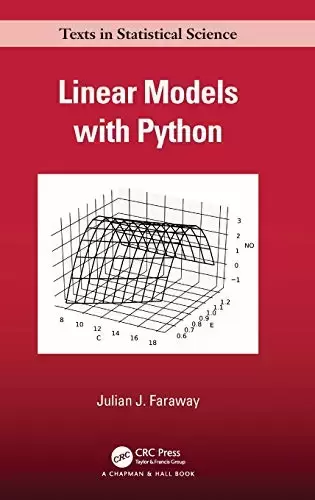
Book Description
Praise for Linear Models with R:
This book is a must-have tool for anyone interested in understanding and applying linear models. The logical ordering of the chapters is well thought out and portrays Faraway’s wealth of experience in teaching and using linear models. … It lays down the material in a logical and intricate manner and makes linear modeling appealing to researchers from virtually all fields of study. -Biometrical Journal
Throughout, it gives plenty of insight … with comments that even the seasoned practitioner will appreciate. Interspersed with R code and the output that it produces one can find many little gems of what I think is sound statistical advice, well epitomized with the examples chosen…I read it with delight and think that the same will be true with anyone who is engaged in the use or teaching of linear models. -Journal of the Royal Statistical Society
Like its widely praised, best-selling companion version, Linear Models with R, this book replaces R with Python to seamlessly give a coherent exposition of the practice of linear modeling. Linear Models with Python offers up-to-date insight on essential data analysis topics, from estimation, inference and prediction to missing data, factorial models and block designs. Numerous examples illustrate how to apply the different methods using Python.
Features:
- Python is a powerful, open source programming language increasingly being used in data science, machine learning and computer science. Python and R are similar, but R was designed for statistics, while Python is multi-talented.
- This version replaces R with Python to make it accessible to a greater number of users outside of statistics, including those from Machine Learning.
- A reader coming to this book from an ML background will learn new statistical perspectives on learning from data.
- Topics include Model Selection, Shrinkage, Experiments with Blocks and Missing Data.
- Includes an Appendix on Python for beginners.
Linear Models with Python explains how to use linear models in physical science, engineering, social science and business applications. It is ideal as a textbook for linear models or linear regression courses.
中文:
书名:使用Python的线性模型
Praise for带R的线性模型:
这本书是任何对理解和应用线性模型感兴趣的人的必备工具。章节的逻辑顺序经过深思熟虑,描绘了Faraway在教学和使用线性模型方面的丰富经验。…它以一种逻辑和复杂的方式铺设材料,并使线性建模吸引了几乎所有研究领域的研究人员。-Biometrical Journal
在整个过程中,它提供了大量的洞察力…即使是经验丰富的从业者也会欣赏的评论。在R代码和它产生的输出中,人们可以找到许多我认为是合理的统计建议的小宝石,并用所选的…示例很好地概括了这些建议我欣喜若狂地读着它,认为任何从事线性模型使用或教学的人都会如此。–《皇家统计学会会刊》
Like its widely praised, best-selling companion version,Linear Models with R,这本书用Python取代了R,无缝地对线性建模的实践进行了连贯的阐述。使用Python的线性模型它提供了对基本数据分析主题的最新见解,从估计、推理和预测到缺失数据、阶乘模型和区块设计。大量的例子说明了如何使用Python应用不同的方法。
特点:
- Python是一种功能强大的开源编程语言,越来越多地被用于数据科学、机器学习和计算机科学。Python和R很相似,但R是为统计而设计的,而Python是多才多艺的。
- 这个版本用Python替换了R,以使统计之外的更多用户可以访问它,包括那些来自机器学习的用户。
- 有ML背景的读者将学习到从数据中学习的新的统计学观点。
- 主题包括模型选择、收缩、块实验和丢失的数据。
- 包括一个适用于初学者的关于Python的附录。
使用Python的线性模型它解释了如何在物理科学、工程、社会科学和商业应用中使用线性模型。它是线性模型或线性回归课程的理想教材。
评论前必须登录!
注册